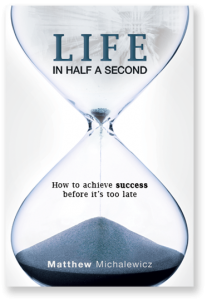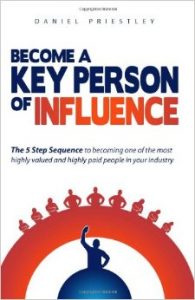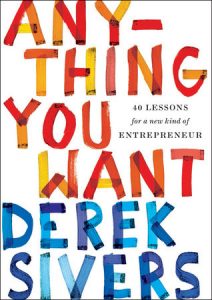Life in Half A Second – by Matthew Michalewicz

Background:
Matthew Michalewicz was born in Poland and lived there until his parents decided to escape the Communist regime. Matthew, now residing in Australia, went on to become a technology and software entrepreuener, creating the companies NuTech Solutions in 1999, SolveIT Software in 2004 and Complexica in 2014. Life In Half A Second is Matthew’s latest book, first published in 2013, and details a 5-step plan to achieving ‘success’, whatever that may mean for you.
Quick Summary:
Planet Earth is over 4.5 billion years old. Homo Sapiens are 200,000 years old. If we scaled down the existence of Planet Earth to 1 year, homo sapiens have been around for all of 23 minutes. On that timeline, our life only measures half a second. When we’re kids, time seems unlimited and seems to pass so slowly. But when we reach adulthood, we realise that “we’ll be spending the vast majority of our “freedom” at work, paying bills, surviving, often in jobs we don’t like or don’t care about”. Matthew lays out a 5 step plan of Clarity, Desire, Belief, Knowledge and Action. He says that these are the 5 ingredients we need to start achieving more in our short lives.
“The tragedy of life isn’t that we only have half a second. The tragedy is that we waste it.”
Who should read this:
This is one for everyone. Certainly not limited to those with business aspirations, these principles can be applied to what ‘success’ you want to achieve. Be that in entrepreneurship, health and weight loss, relationships, projects, or ticking things off your bucket list (which Matthew says we should all write down and complete each year!). It’s not a very long book but it has a big impact. Matthew tells some funny stories and uses some great analogies. Well worth the read.
Favourite Chapters:
The book is set out in 5 chapters, one chapter form each of the steps. They’re all important, so I’ll summarise the main points from each step. Matthew calls these the 5 “Doors to Success”, and each door has a key that opens it.
The First Door: CLARITY
“Successful people get what they want out of life because they know what they want”. The first Door to Success is achieving a sense of Clarity – working out exactly what you want to achieve in life. Matthew argues that you need to set goals, and you achieve success when you attain those goals. Your success is linked to what goals you set. You can set either small goals or big goals, and in turn, your success can either be small or big (small isn’t a bad thing, it’s all relative, as long as you know that you want to aim small and achieve small).
He also points out the differences between ‘success’ and ‘financial success’. Most people immediately think of money when they think of success, but this shouldn’t be your only focus. Of course, everyone needs money to live though, so ‘financial success’ must form some part of your consideration.
Part of the power of setting goals is the mental focus it brings – “once you have a clear goal, you begin thinking about it, and by thinking about it, you narrow your attention and efforts to activities related to the goal”. By having goals in place, you mind can focus and you can begin moving towards your goals.
The key to the Door of Clarity: Set precise goals.
Matthew talks a lot about Visualisation, something I’ve never personally got into but it seems to work for a lot of people! Maybe it’s something worth trying out. Matthew also says that less 1% of the population has goals, writes them down and reviews them (having goals is a lot better than not having them, but it’s even better to write them down and regularly review them to ensure that you’re on track to achieving them). Another thing Matthew advocates is spreading your goals around your trusted circle of friends and family to create some public commitment and gives you a team of people to keep encouraging you towards achieving your goals.
The Second Door: DESIRE
“Desire is the reason you do what you do”. If you don’t enjoy your job or you don’t enjoy exercising, you may do them anyway out of your desire to earn a pay check and buy food or your desire to be healthy and look good. Desire influences every decision we make. It’s therefore important to align your goals with things you desire. This will help strengthen your commitment, “help you overcome obstacles, recover from setbacks, and push through adversity and disappointment”. Low desire equals low effort – you will work a lot harder towards goals that you truly desire.
“The key to the Door of Desire is to align you goals with desire”.
I really interesting way to approach this is to list the things that you HATE. We all have things that we think we want in life and we can set goals to go about achieving those things, bu Matthew suggests it may be easier to identify the things we DON’T want in our lives. This is because we know exactly what the things we don’t want are because they already exist, and we don’t have to try and imagine what they might be. So, Matthew suggests we identify the most negative thing in our life right now, and set goals that will go about eliminating those things.
The Third Door: BELIEF
After a few funny annecdotes, Matthew tells us that whilst we don’t need to believe everything we read in his book or everything we see and hear in the world, we do need to believe 100% in OURSELVES. He informs us of some crazy medical stories about controlled trials where placebos have worked just as effectively as the actual treatments. Even as extreme as sham knee replacements that led to real recovery! By the same token, there are also nocebos that have the exact opposite effect; a harmless substance that will negatively impact us if we think that it will. Whilst this isn’t a book on medical advice, it really is amazing what can happen if we truly believe.
Matthew asks us “what’s the point of trying if success is impossible?”. If we believe that we would never be able to achieve success, of course, we would never actually take action and therefore we would never accomplish it. Matthew also tells some great historical triumphs where people broke the “belief barrier” and it led to a flood of record breakers.
The key to the Door of Belief is changing your environment. This is because our beliefs are formed as a direct result of our environment. If no one in our family has started a business before, we probably wouldn’t have the belief that we could do it. If all our friends are earning $60,000 a year, we wouldn’t believe that earning $1,000,000 a year is possible.
He references Jim Rohn’s famous quote that “you are the average of the five people that you spend the most time with”. By spending time with people who are achieving more than you are currently achieving, your beliefs will shift and you will start achieving more. Keep in mind that a good way to easily change your environment is to start ‘spending time’ will successful people by reading their biographies, reading their books and blogs, listening to their podcasts and watching their documentaries. You may not be able to meet face to face with ultra-successfully people right now. But reading, watching and listening is a great place to start.
The Fourth Door: KNOWLEDGE
“Studies have shown it’s easier to achieve success if you know how to achieve it”. Seems pretty obvious doesn’t it. Matthew argues that someone has already achieved pretty much anything we want to achieve; so all we need to do is learn how they did it and repeat. Matthew reiterates here that there are many different paths to success, and generally the faster the path the more risky it becomes. By learning exactly how people have achieved success in the past, our path becomes a whole lot easier.
A major part of achieving success is setting a ‘goal pyramid’. Well worth having a look at this section. It’s a great way of mapping our goals and gives you a clear path of action to achieve them. By the way, you’ll see a free little bonus at the bottom of this post! Hint – Matthew has done a short video series about his book that you can access for free through this link! By setting a goal pyramid, you know exactly what steps you need to take on the way to your goals and you give yourself some obvious milestones you can celebrate along the way.
Invest in Yourself
YOU are your own greatest asset, and the key to the Door of Knowledge is to invest in yourself. There is a massive difference between knowing ‘what’ and knowing ‘how’ – know what you want is a major step in itself, but it is useless unless you know exactly how you can going about attaining it.
An important element Matthew mentions here is the exchange rate between life and cash. It’s a great concept and he also touches on how important it is to OWN something, rather than just being a worker (this may be a business, real estate, stocks, but also the right to a song or book you’ve created). This is where you can really earn money. He doesn’t spend a lot of time on it though, so if this little section intrigues you, I recommend reading something like Rich Dad, Poor Dad or The Richest Man in Babylon to get you even more fired up.
The Fifth Door: ACTION
At the end of the day, nothing is going to happen unless you actually take ACTION. You have to get out the and DO STUFF. So go. Now! Go do it.
The reason Matthew decided to take action was because he wasn’t content with living on the median wage of $33,000 at the time for the rest of his life. He had bigger dreams and bigger goals, so he needed to commit and start taking action. He says that whilst many people read self-help books and go to seminars, they still don’t achieve success. The reason? “People aren’t looking for the ‘secrets’ to success, they’re looking for the ‘shortcuts’ to success”. He argues that people want success, but most aren’t willing to put in the hours. Most don’t put in the effort and take the necessary calculated risks to get there.
And what is the major reason we don’t take action? Fear. Fear of failure, fear of success, rejection, embarrassment, change, criticism, commitment… We fear so much that is tranquilizes us and we don’t take action. In the past, our ancestors had fear of war and famine and disease, things that are far more tangible and dangerous than our fears of failure or embarrassment. Ultimately, we are going to regret the things that we never tried a lot more than the things we failed at. So get out there and start trying new things and taking action.
Favourite Quotes:
“We’ll be spending the vast majority of our ‘freedom’ at work, paying bills, surviving, often in jobs we don’t like or don’t care about”
“The tragedy of life isn’t that we only have half a second. The tragedy is that we waste it.”
“Can we only live when we’re dying?”
“Because you measure time in ‘years lived’ rather than ‘days left’, the future seems unlimited, so you defer and wait”
“[We] do very little of what [we] ‘have to’ and very little of what [we] ‘want to’”
“There’s a countdown on my life. And guess what… There’s a countdown on yours as well”
“It’s not a disgrace to not reach for the stars, but it’s a disgrace to have no stars to reach for” Benjamin Mayes
“There is no question that life is but a moment, a snap of the fingers. The real question is: what are you going to do with that moment?”
“Successful people get what they want out of life because they know what they want”
“Success is defined by what you aim for – by what goals you set”
“Once you have a clear goal, you being thinking about it, and by thinking about it, you narrow your attention and efforts to activities related to the goal”
“Only one person in a hundred has goals, writes them down, and regularly reviews them”
“People abandon their dreams because of the risks and the consequences of failure”
“Do or do not… There is no try” Yoda
“What the point of trying if success is impossible?”
“Your environment has influenced you since the day you were born”
“A positive environment will feed your self-belief like oxygen feeds a flame”
“Go to the library, borrow books, subscribe to blogs, download podcasts, discover the world, get inspired”
“Anyone can change their environment if they want to, if their desire is strong enough, and when they change their environment, their self-belief will change with it”
“Studies have shown that it’s easier to achieve success if you know how to achieve it”
“Ignorance is the most expensive thing in the world ”
“Knowing the path – knowing what to do – is only half the equation. The other half is knowing how to do it.”
“You will never become wealthy unless you own something”
“People aren’t looking for the ‘secrets’ to success, they’re looking for the ‘shortcuts’ to success”
“In the same way that fears are learned, they can also be unlearned”
“Whenever you say ‘I can’t’, what you’re really saying is ‘I don’t want to’”
“The greatest failure you can experience in life is not trying”
“The only person responsible for you success is you”
“Make the most of your days left, do everything you want to do, and do it now, before it’s too late”
Bonus
As promised, you can get free access to Matthew’s Life In Half A Second video series. Take the challenge today by taking action on what you’ve learnt form the book. Sign up here to get free access. Send us your success stories when you’ve achieved your success.

